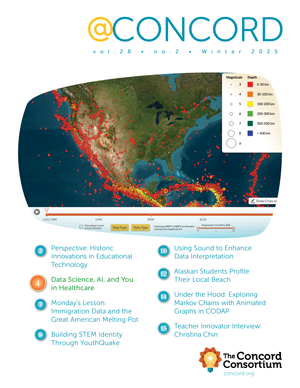News at Concord Consortium
The Concord Consortium is happy to announce the following new grants from the National Science Foundation.
Mobile Design Studio
We’re partnering with the University at Buffalo to enable students in grades 7-10 to collaboratively problem scope, generate, and evaluate engineering design ideas. Students explore environmental and Earth science problems that include science, engineering, and social/community factors, such as access to clean water and increasing biodiversity loss in local communities. We will transform our Collaborative Learning User Environment (CLUE) into a front-end design platform called the Mobile Design Studio (MODS). Students will work in small groups on front-end design challenges in MODS, exploring potential solutions by considering both stakeholders and context. An artificial intelligent design mentor will guide students through an exploration of ideas and “learn” from students’ design processes to scaffold their ideation through a pedagogically framed creativity tool called Design Heuristics. We will examine students’ perceptions of science and engineering, their ability to integrate academic and personal or community knowledge, their confidence for engaging in engineering, and their design thinking abilities.
Investigating Mathematics Learning in a Digital Environment Over Time
A new project with Michigan State University is developing and embedding learning analytics into digital notebooks to provide middle school students with information on their engagement and learning of mathematics and to support reflection on big mathematical ideas across an entire year. We will embed the seventh grade Connected Mathematics Project (CMP) curriculum into CLUE, which automatically logs every student action and sequence of events, then create learning analytics based on these log data. Just as students have access to fitness data on smartwatches and app usage on smartphones, they will be able to use a dashboard of analytics about their work in CLUE to consider questions such as: “Do I modify or build on the work of others? Do I use previous work to make sense of unfamiliar problems and mathematics?” Project research will explore the use of dashboard visualizations on collaborative engagement and mathematics learning.
Data Science Foundations with Mathematical Logic for Rural High School Students
Data science is revolutionizing science and industry. The current job market has shown a strong demand for a workforce fluent in data science. However, rural students are less likely to choose a STEM major and have far less access to advanced STEM courses taught by highly qualified teachers. We’re partnering with Texas Tech University to develop a new curriculum for the Florida Virtual Schools to introduce high school students, including in rural communities, to data science concepts and careers. The novel LogicDataScience (LogicDS) curriculum will unify foundations of data science in computing, mathematics, and statistics through mathematical logic. Project research will study the impacts of the curriculum on students’ learning of computing, mathematics, and statistics.
Developing Simulations with Noise to Investigate Students’ Understanding in Experimental Physics
Understanding measurement uncertainty is critical for evaluating experimental data and conclusions made from those data, but studies show that students in introductory undergraduate physics lab classes do not attain these learning goals. To improve students’ conceptual knowledge of and views about measurement uncertainty, we’re working with the University of Colorado at Boulder to add sources of randomness (noise) to a selection of Physics Education Technology (PhET) interactive simulations of common introductory lab experiments. These noise-enhanced simulations will be integrated with CODAP so that students can study the effect of the noise and quantify the resulting uncertainty. We will study the impact of the use of this integrated platform on students’ understanding of measurement uncertainty and how students view measurements in experimental science in a clinical setting and in the classrooms of diverse institutions. We will develop strategies and associated curricular materials for implementing this new platform in undergraduate lab courses to help students reason better about and make decisions with data in their future studies and careers.
This material is based upon work supported by the National Science Foundation under grants DRL-2201215, DRL-2200763, DRL-2201393 , and DUE-2142356. Any opinions, findings, and conclusions or recommendations expressed in this material are those of the author(s) and do not necessarily reflect the views of the National Science Foundation.
